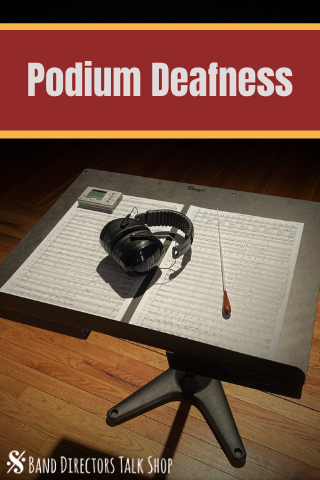
As a young middle school and high school band director, I would often step off the podium at the end of a rehearsal feeling like the band was really starting to sound great, only to listen to the rehearsal recording later and find that they didn’t sound very good at all. I began to wonder if, and worry that, I just didn’t have a very good ear and was not cut out to rehearse an ensemble. Amid these feelings of self-doubt, I invited a guest to come and rehearse my ensemble. During this rehearsal, I realized what the real problem was. I could hear the deficiencies in my ensemble just fine when I was on the sidelines, I just didn’t hear them when I was on the podium conducting a rehearsal.
Feeling a little less discouraged, I sought out to find if any peers were experiencing this same problem. After asking around a bit, I heard several people refer to this phenomenon as “podium deafness.” Does any of this sound familiar? If so, I hope that my experiences and research can help you to be successful and productive as you learn to cope with podium deafness. This will be addressed in three sections.
- The data from a survey I conducted
- Probable causes of podium deafness from a discussion with a cognitive psychologist
- What you can do right now to be more successful and productive
Let’s start with a working definition of podium deafness: a phenomenon in which music conductors are less inclined to hear errors and/or musical deficiencies in their ensemble while they are on the podium conducting during a rehearsal.
Survey results
In 2018 I surveyed about 150 band directors from across the country. This survey asked directors to self-evaluate and rank their ability to hear errors and/or musical deficiencies in their ensemble while on the podium and while off the podium. They ranked their ability to hear these errors and/or musical deficiencies from 1 to 6, with 1 meaning they hear very poorly and 6 meaning that they believe they hear everything they need to hear. Then I asked them demographic and rehearsal practice questions to see if I could find any correlations between podium deafness and demographics/practices (I know, correlation does not equal causation, but it’s still valuable information). Ready for a big shocker? Only 16% (!!!) of the surveyed directors said that podium deafness has never caused them to be less effective as a teacher. The graphs below group survey participants by demographics/practices, and show the average hearing score (1-6) for each group.
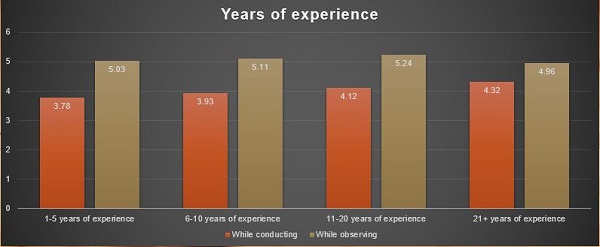
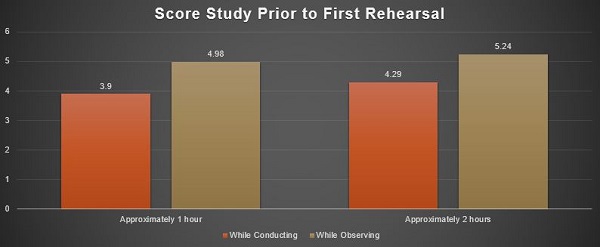
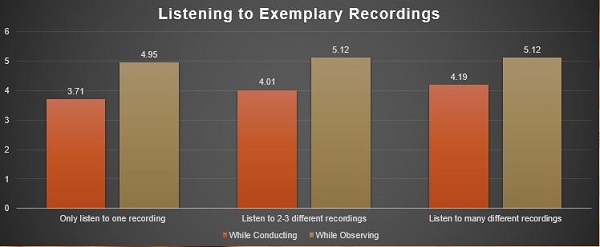
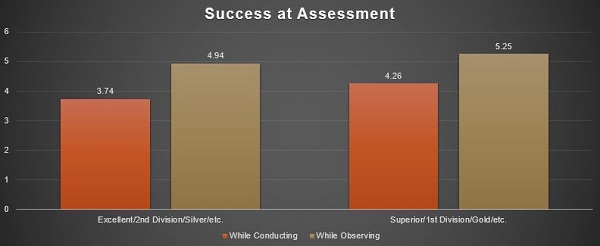
Notice anything? It would seem that experience, score study, exemplary recordings, and better sounding bands all correlate with less podium deafness.
Probable causes of podium deafness
The next step for me was to take this information to a cognitive psychologist and see if this data could help them theorize about what might be causing podium deafness for approximately 84% of the people in our profession. Here’s what I was told:
- Divided attention
- Stress and anxiety
- Desensitization
Divided attention very much diminishes cognitive function. We are all familiar with the concept of doing so many things that we cannot do all of them as well as we would like (isn’t that the definition of being a band director?). Well, turns out that this is likely one of the causes of podium deafness.
Stress and anxiety are never a problem for band directors, right? Come to find out, NASA has done a pretty extensive study about how stress and anxiety diminish cognitive function. So, that upsetting email you receive 5 minutes before rehearsal starts is probably going to make your podium deafness worse on that day.
Too much of anything will likely cause you to become desensitized to it. For example, the more you listen to poor intonation the less you will notice it. The more you listen to poor tone quality, the less you will notice it. It is very possible that we become desensitized to the errors and/or musical deficiencies in our ensembles.
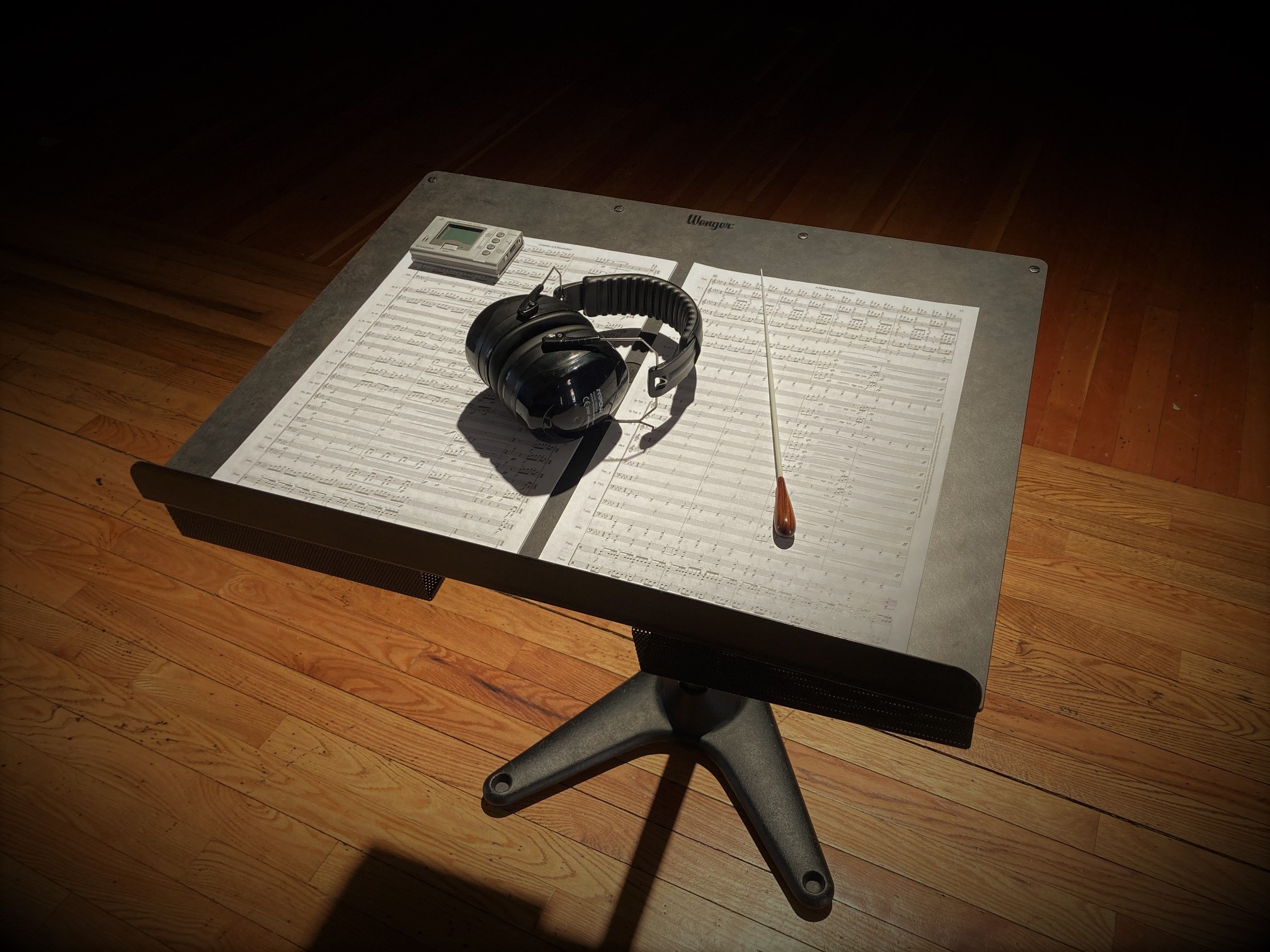
Quick and Easy Solutions
Finally, here are 10 easy to implement rehearsal techniques/practices that should help you right away.
- Get off the podium!
- Eliminate some of your divided attention and just walk around and listen, then go back to the podium and address what you heard.
- Study the score sufficiently
- One of the biggest attention draws contributing to divided attention is the reading of the score. Take the time to learn the music so that the score is just a reference. Don’t learn the music with the band, learn it first and then teach it to them.
- Record the ensemble
- After working on a chunk, do a complete run-through of it and record it. Listen to the recording and then address what you heard in the next rehearsal. Consider sending the recordings to the students to listen to as well, and ask what they hear.
- Relax and unwind
- Find a de-stress solution that works for you. We all need it. Yoga, prayer, meditation, etc.
- Train your students to listen
- Don’t make yourself responsible for all the listening, let students help. Maybe use “A-B coaching” where students take turns listening to each other and providing feedback.
- Listen to an exemplary recording before rehearsal
- This will help to reset your desensitization. Don’t let your ensemble be the only group you hear play the music.
- Focus on listening to one thing at a time
- Tell your students that, for this run-through, you are going to be 100% focused on rhythm, or intonation, or key signature, etc.
- Change the setup
- Help break up the desensitization by trying a circular setup or some other setup so that you can hear something new.
- Don’t sing while you conduct
- We’ve all done it before. Don’t add an additional task to your already divided attention.
- Invite a guest to clinic your band
- Always a good practice. In this case, it allows you to spend an entire rehearsal just listening to your band and taking note of how they sound.
Dr. Michael C. Black holds the title of Assistant Professor of Music and Director of Instrumental Activities at Franklin College, in Franklin, Indiana, where he conducts the Franklin College Wind Ensemble and Franklin College Pep Band. He is a graduate of the University of Kentucky, University of Connecticut, and Northeastern State University in Tahlequah, Oklahoma. Before graduate school, Dr. Black spent several years as a high school and middle school band director in Eastern Oklahoma.
Related Reading:
Why Doesn’t My Band Sound Good?
Does Your Band Sound Better From the Back?
Conduct Backwards – Quick Tip
If you would like to receive our weekly newsletter, sign up here.
Don’t forget to like us on Facebook too!
Learn. Share. Inspire.
BandDirectorsTalkShop.com


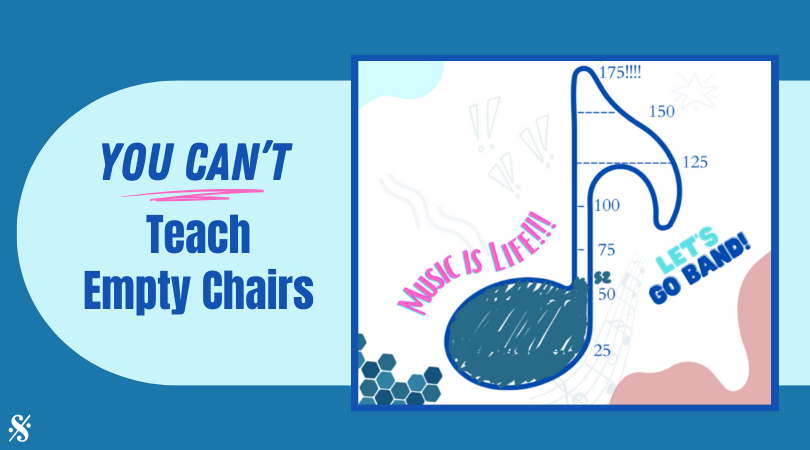
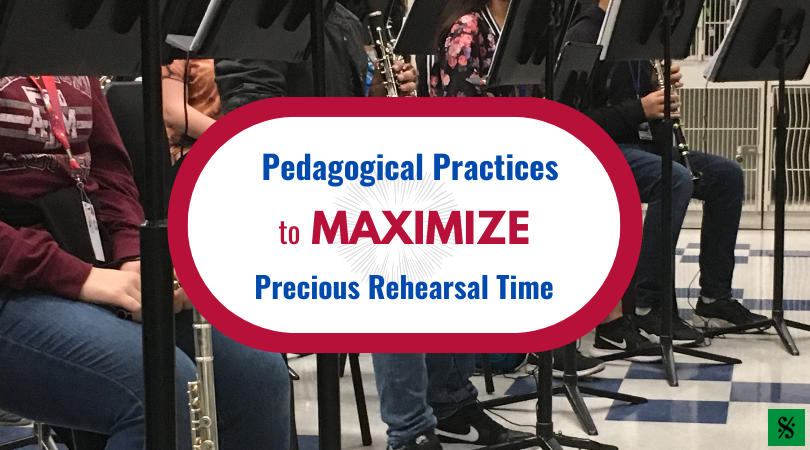


Leave a Reply
You must be logged in to post a comment.